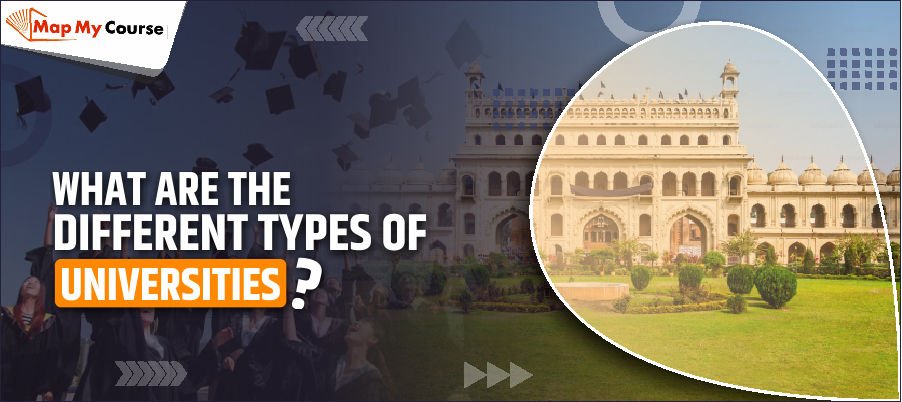When it comes to higher education, understanding the different types of universities becomes important to make an informed decision about where to pursue your academic degree. In India, universities are categorised based on their governance, ownership, and the scope of education they offer.
Whether you are looking for a public university or a private institution, knowing the differences between these university types will help you choose the best one for your academic and career goals.
This blog will talk about the different types of universities in India, explaining the key differences between central, state, private, deemed, and autonomous institutions
Understanding the Education System in India
During their higher education, students gain theoretical as well as practical knowledge. Even after having a bachelor’s degree, many students move for further studies like an MA, M.Com, or M.Sc to get specialization in their field.
India has a diverse range of higher education institutes, including public universities, private universities, and specialised institutions like IITs, IIMs, and AIIMS. These institutions are primarily operated by bodies like UGC and AICTE to ensure that they meet high academic standards. Bodies like the National Institute Ranking Framework (NIRF) help students compare universities on different criteria, such as teaching quality, infrastructure, and research.
Different Types Of Universities In India
1. Central Universities
Central Universities are funded by central government, and combinedly managed by University Grants Commission and Central Government. These universities spread across the country and offer high-quality education with high academic standards. Because of its value, admission to these universities are highly competitive and entrance exams are conducted by the university or at the national level.
Top Central Universities In India | |
University/Institute | State |
Jawaharlal Nehru University (JNU) | New Delhi |
University of Delhi (DU) | New Delhi |
Banaras Hindu University (BHU) | Uttar Pradesh |
Aligarh Muslim University (AMU) | Uttar Pradesh |
Jamia Millia Islamia (JMI) | New Delhi |
2. State Universities
These universities are primarily funded and managed by the respective state governments. They typically focus on meeting the educational needs of the local population, offering a wide range of undergraduate and postgraduate programs. Admissions to state universities are generally based on state-level entrance exams or merit-based criteria.
Top State Universities In India | |
University/Institute | State |
University of Mumbai (MU) | Mumbai |
University of Calcutta (CU) | West Bengal |
University of Madras (MU) | Chennai |
Osmania University (OU) | Hyderabad |
Punjab University (PU) | Punjab |
3. Institutes of National Importance
These Institutes are specialized Institutions focused on specific areas like engineering, medicine, social sciences, and management. These institutions are recognized and funded by the Government of India. INIs offer world-class education and research opportunities. Admission to these institutes is highly competitive, with national-level entrance exams such as JEE or NEET.
Top Institutes of National Importance In India | |
University/Institute | State |
Indian Institute of Technology (IIT) Delhi | New Delhi |
Indian Institute of Technology (IIT) Bombay | Maharashtra |
Indian Institute of Technology (IIT) Kanpur | Uttar Pradesh |
Indian Institute of Technology (IIT) Madras | Tamil Nadu |
Indian Institute of Technology (IIT) Kharagpur | West Bengal |
4. Private Universities
These universities are funded and manged by private organizations and trusts. However, these universities are more expensive than public universities but they offer modern infrastructure, low faculty to student ratio. Many private universities also have collaborations with international institutions, offering students global exposure.
Top Private Universities In India | |
University/Institute | State |
Manipal University (MU) | Karnataka |
Symbiosis International University (SIU) | Maharashtra |
Amity University (AU) | Uttar Pradesh |
Birla Institute of Technology and Science (BITS) | Rajasthan |
Lovely Professional University (LPU) | Punjab |
5. Deemed Universities
These universities are those who have been granted the status of a University by University Grants Commission (UGC) due to their excellence in a specific field. Deemed universities primarily focus on a discipline or set of disciplines, making them ideal for student who want to specialize in a specific area of study.
Top Deemed Universities In India | |
University/Institute | State |
Indian Institute of Science (IISc) | Karnataka |
Tata Institute of Fundamental Research (TIFR) | Maharashtra |
Indian Institute of Information Technology (IIIT) | Telangana |
Sri Ramachandra Medical College and Research Institute (SRMC) | Tamil Nadu |
Kalasalingam Academy of Research and Education (KARE) | Tamil Nadu |
6. Autonomous College
Autonomous colleges are institutions that are affiliated with a university but have the freedom to design their own curriculum, conduct their own examinations, and set academic standards. The curriculum often allows students to choose from a range of elective courses and design their education to specific interests.
Top Autonomous Colleges In India | |
University/Institute | State |
St. Stephen’s College (SSC) | New Delhi |
Hindu College (HC) | New Delhi |
Madras Christian College (MCC) | Tamil Nadu |
Fergusson College (FC) | Maharashtra |
Ramakrishna Mission Vidyamandira (RKMVM) | Karnataka |
Central, State, and INI Universities in India: Key Differences Explained
Feature | Central Universities | State Universities | Institutes of National Importance (INI) |
Funding | Funded by the Government of India | Funded by the respective state governments | Funded by the Government of India |
Management | Managed by the Government of India | Managed by the state government | Directly managed by the Government of India |
Admission Process | University-specific entrance exams or national exams | State-level exams or merit-based criteria | National-level entrance exams (e.g., JEE, NEET) |
Programs Offered | Wide range of programs across various disciplines | Undergraduate and postgraduate programs in various fields | Specialized programs in engineering, medicine, management, etc. |
Global Recognition | High, especially for research and faculty | Varies, some are well-known regionally or nationally | Extremely high in their respective fields |
Difference Between Private, Deemed And Autonomous Institutes In India
Feature | Private Universities | Deemed Universities | Autonomous Colleges |
Funding | Funded by private organizations or trusts | Funded by the Government of India, but managed privately | Funded by the university they are affiliated with (usually state or central) |
Management | Managed by private entities or trusts | Managed by private entities but recognized by UGC as universities | Affiliated with a larger university but self-managed to some extent |
Admission Process | Based on university-specific entrance exams or merit | Based on university-specific entrance exams or national exams | Based on university entrance exams, with some autonomy in setting the curriculum |
Programs Offered | Offers a wide range of undergraduate and postgraduate programs | Specialized programs in specific fields, with more autonomy in curriculum design | Primarily undergraduate programs, some postgraduate, with flexibility in electives and curriculum |
Global Recognition | High, especially for those with international ties | High in their specialized fields (e.g., BITS Pilani, VIT) | Varies by college, often well-known regionally or nationally |
Top Things to Consider When Choosing the Right University in India
- Accreditation and Reputation
Make sure the university is approved by the authorised educational bodies like UGC or AICTE. A well-known university, especially in the field you want to study, can lead to more job opportunities and make your degree more valuable.
- Faculty and Expertise
Look at the teachers or professors who will be teaching you. It’s best to choose a university with experienced faculty who know their subjects well and can guide you in your studies. Experienced professors can also help with career advice.
- Infrastructure and Facilities
The university should have good facilities to support your learning. This includes modern classrooms, well-equipped labs, libraries, and study spaces. Good infrastructure can make your learning experience better and more comfortable. - Location and Accessibility
Think about where the university is located. Ask yourself, is it easy for you to travel there? Is the university in a city with job opportunities in your field? The right location can make a big difference in your overall learning experience. - Placement and Career Services
A good university should help students find jobs or internships after graduation. Look for universities with strong placement services that can help you with jobs, internships, and career advice.
Conclusion
n conclusion, understanding the different types of universities in India, whether they are central, state, private, deemed, or autonomous, to know about them is important for making an informed decision about your higher education.
Each type of university has unique opportunities, benefits, and challenges, so it’s important to check what aligns best with your academic interests, career goals, and personal requirements.
By considering factors like reputation, location, academic programs, and authoritative structure, you can choose the university that matches your needs. Ultimately, the right choice will set you on the path to academic success and a fulfilling career.
Frequently Asked Questions
Q.1 Are Private Universities in India worth it?
Ans. Private Universities often offer modern facilities, smaller class sizes, and global exposure through international partnerships. While they may be more expensive, many have a good reputation and strong placement services, making them a good choice for some students.
Q.2 Are all universities recognized by the government?
Ans. No, not all universities are recognized by the government. It is essential to check the recognition status of a university before applying.
Q.3 What is the difference between a university and a college?
Ans. A university is a larger institution that offers undergraduate, postgraduate, and doctoral programs, while a college is a smaller institution that offers undergraduate programs.
Q.4 How do I check the ranking of a university?
Ans. You can check the ranking of a university by visiting the website of a reputable ranking agency, such as the National Institutional Ranking Framework (NIRF) or the Times Higher Education (THE) World University Rankings.






















